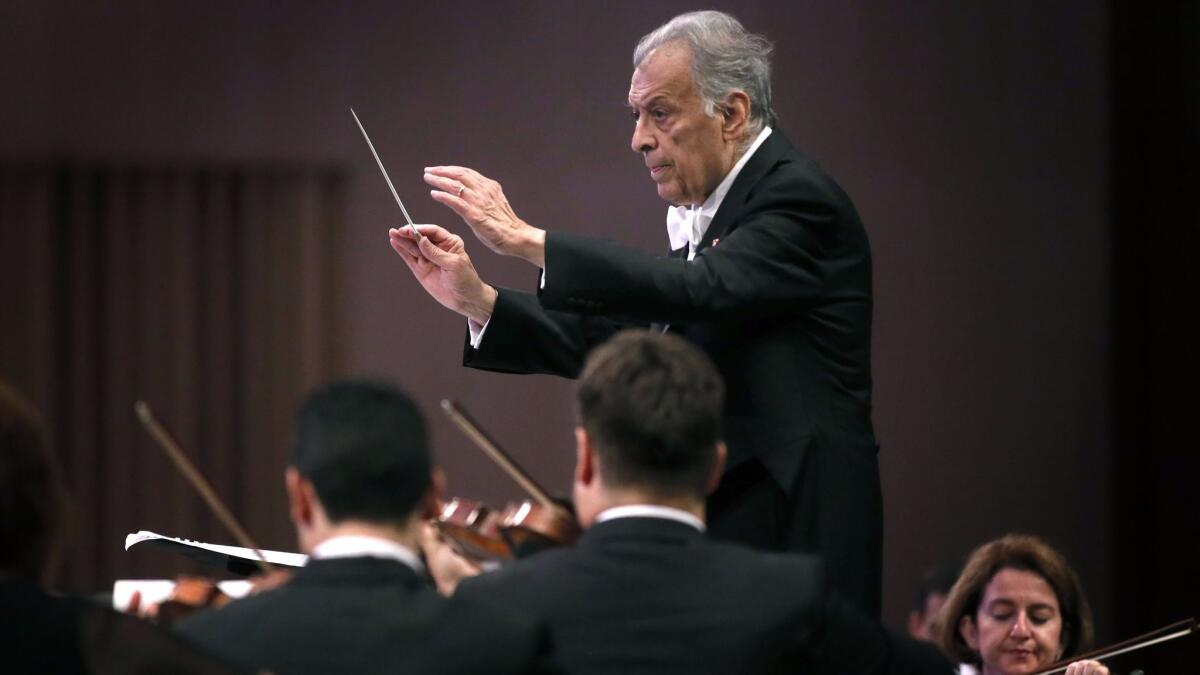Review: With a farewell on the horizon, Zubin Mehta’s concert with the Israel Philharmonic is a triumph

- Share via
Zubin Mehta and the Israel Philharmonic Orchestra are touring North America again — which ordinarily wouldn’t be considered a milestone. But this time it might be, because Mehta has decided to step down as the orchestra’s music director for life in October 2019 — 50 years after he became its music advisor and 42 years after he became its first official music director.
With no U.S. tours scheduled for 2018, it’s possible that Los Angeles has seen the last of one of the most durable conductor-orchestra teams in history, right up there with Eugene Ormandy and the Philadelphia Orchestra (44 years), Willem Mengelberg and the Amsterdam Concertgebouw (50 years) and Evgeny Mravinsky and the Leningrad Philharmonic (also 50 years).
If Monday night turns out to be their last visit to Walt Disney Concert Hall, Mehta and the Israel Philharmonic went out in triumph — and not without a few new ideas.
Mehta was music director of the Los Angeles Philharmonic from 1962 to 1978. The last time I saw him in town with the Israel orchestra was two years ago in the Wallis Annenberg Center for the Performing Arts, whose 500-seat main hall proved to be too small and dry-sounding for a large orchestra. Back in Disney Hall, the orchestra’s sound bloomed and took on a clarity, with smoother execution and more solid underpinning. Knowing Disney Hall well, Mehta seated the cellos and basses left-center, the best way to get a firm bass sound here. (The Chicago Symphony Orchestra could not do the same with conventional hard-right cello-bass seating two Sundays ago.)
On Monday the conductor and the orchestra were on their game. Mehta, now 81, is more economical with his gestures, but his beat remains as crisp as ever and his left-hand cues graceful and welcoming.
First up was a short suite from Israeli composer Amit Poznansky’s 2011 score for the Joseph Cedar film “Footnote,” the entire score of which is worth a listen. The music is pleasingly neoclassical in texture and full of crystalline detail, with a Shostakovich-like waltz, touches of harpsichord and sly episodes for the winds and piano — all neatly summed up in just seven bustling minutes.
Pianist Yefim Bronfman, who has had some cancellations this fall due to illness and a death in the family, turned up in the Beethoven Piano Concerto No. 3 in a subdued mood, emphasizing delicacy, clarity and even mystery while the orchestra poured forth in song for Mehta in the second movement. Afterward, Bronfman served up a meltingly beautiful rendition of the poignant Chopin Etude Opus 10, No. 3 as an encore.
In the Schubert Symphony No. 9, Mehta took the unusual step of seating the eight winds in a semicircle at the front of the orchestra instead of within the ranks. The symphony seemed recast into a concerto grosso for wind octet and orchestra, the expert Israeli winds gaining in expression by interacting with one another face-to-face without upsetting balances with the rest of the orchestra. The result was a superb, at times mighty Schubert Ninth, the power of a big orchestra juxtaposed with the intimacy of communing winds.
With a bit of the old Mehta fire and dash, the orchestra capped the evening festively with Dvorák’s Slavonic Dance Opus 46, No. 8 and Johann Strauss Jr.’s “Tritsch-Tratsch” Polka.
SIGN UP for the free Essential Arts & Culture newsletter »
See all of our latest arts news and reviews at latimes.com/arts.
ALSO:
A Venezuelan life force for the Master Chorale’s Day of the Dead program
The Philip Glass effect on film: Transforming ‘Dracula’ and ‘Beauty and the Beast’
Susanna Mälkki brings more news to the Los Angeles Philharmonic
More to Read
The biggest entertainment stories
Get our big stories about Hollywood, film, television, music, arts, culture and more right in your inbox as soon as they publish.
You may occasionally receive promotional content from the Los Angeles Times.










